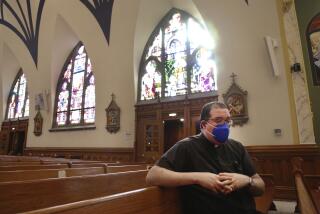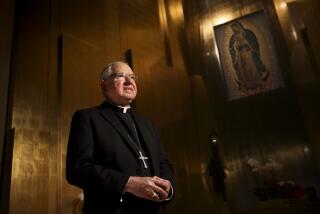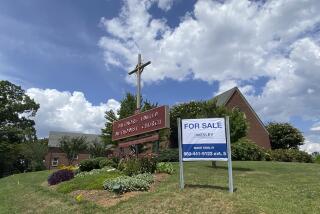Religion copes with fear of coronavirus spread
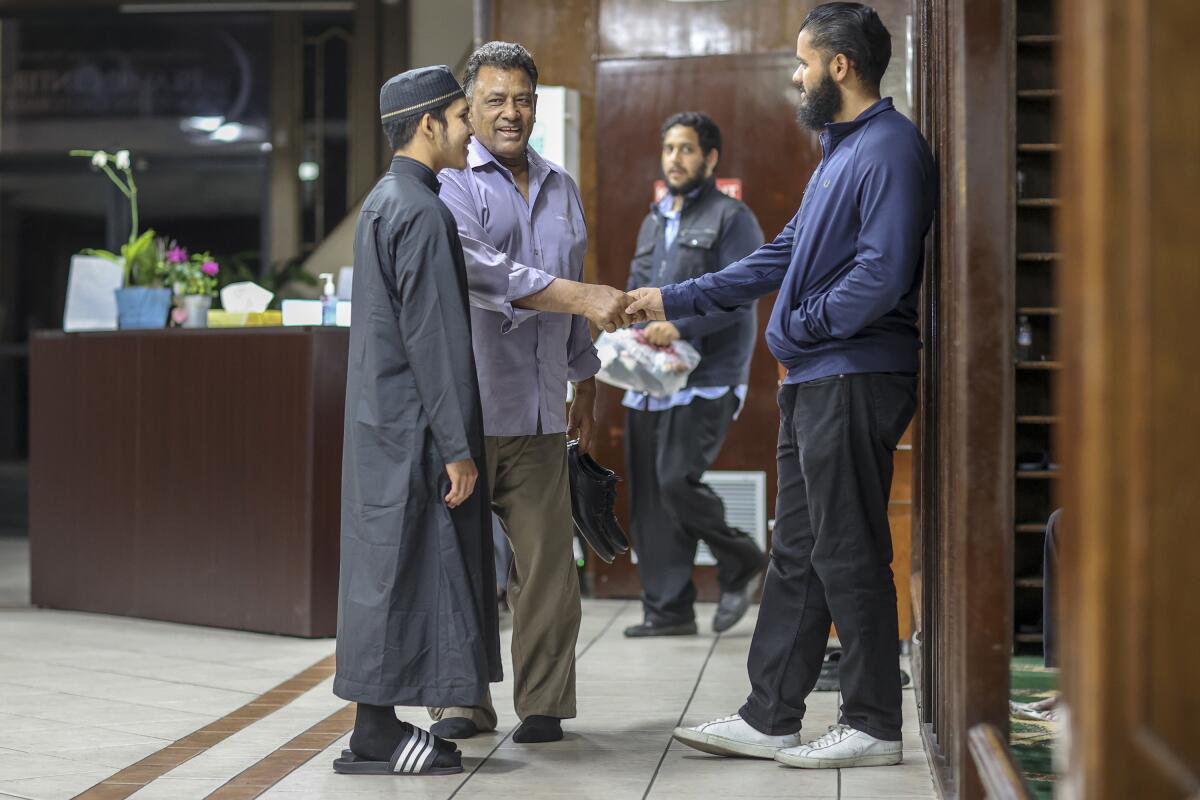
At St. Frances X. Cabrini Roman Catholic Church in Yucaipa, Calif., the holy water fonts have been left dry. Parishioners must now bring their own water and ask the priest to bless it.
Congregants at the IKAR Jewish synagogue will now get their Saturday communal meals not by preparing their own plates, but courtesy of gloved workers.
At the Islamic Center of Southern California near Koreatown, the faithful are being encouraged to avoid greeting one another with embraces and handshakes. Because worship involves contact not only with other people but with the carpet when bowing toward Mecca, the sick are being asked to pray at home.
In places of worship, across various faiths and religious denominations, rituals and practices are being tweaked to adapt to the outbreak of a disease that thrives on nothing more than close human contact. Religious communities built on the idea of gathering, celebrating, greeting, grieving and praying in a spirit of togetherness find themselves trying to create distance to fend off the spread of illness.
Across California, more than 80 people have been infected with the coronavirus. In the U.S., there have been at least 381 confirmed cases, with most centered in Washington state, where 108 people have tested positive and 16 have died. More than 100,000 people have become infected worldwide, according to the World Health Organization.

On Friday, the Los Angeles Archdiocese recommended a halt to the use of cups of wine for Communion and urged draining holy water fonts that did not include a filtration system. The archdiocese also asked churchgoers to accept the Communion wafer in their hand, instead of directly in the mouth, and to refrain from shaking or holding hands.
At the San Gabriel Mission, about 40 participants in Thursday morning’s Vietnamese-language Mass said hello through bows — avoiding any hugs and kisses.
After the service, they gathered to eat kung pao chicken and shrimp and white rice to bid farewell to a visiting priest, Joseph Ngo Van Lang, who would leave that night for the Philippines.
“We cannot hug, so we bow and wave,” said Catherine Pham, 60, of San Gabriel.
Within seconds of entering the Islamic Center on Wednesday evening, 62-year-old Ahmed Nettabai greeted fellow worshipers with hugs, laughs, pats on the back and handshakes. The Santa Monica resident had arrived to attend sunset prayer, known as Maghrib.
On Feb. 27, the center emailed members with precautions to take because of the coronavirus. It included links to Los Angeles County’s public health department, which has developed an action plan to minimize the risk of COVID-19 infection, including washing hands with soap for at least 20 seconds. But the Islamic Center also encouraged avoiding certain practices, including some of the very things that Nettabai did the moment he showed up for worship.
“I’ve been hugging people since I was a boy,” he said. “It’s difficult to change.”
Islamic Center spokesman Omar Ricci, 51, said it was understandably difficult to forgo certain gestures, even if it is — as hoped — a temporary measure.
“There’s almost a muscle memory to extend your hand and shake,” he said. “You have to sort of catch yourself doing that.”
Islamic Center assistant manager Osamah Bin-Mahfouz, 27, said many devout Muslims wash their hands, arms, nose, face, head, feet and ankles before each of the five daily prayers, or Salat.
“We’re a little ahead of others,” he said, pointing to mounted hand sanitizers and bottles of Purell placed around the center.
Friday afternoon’s Jum’ah, or congregational prayer, draws crowds in the hundreds and the center is advising those who feel ill to stay home. It’s the same message being delivered at the Islamic Society of Orange County in Garden Grove.
There, religious director Muzammil Siddiqi has told people to follow the health advisories issued by the county or state. Orange County declared a local health emergency in regard to the novel coronavirus on Feb. 26.
“It is advised to all people that if you are not feeling well, don’t come,” Siddiqi said. “You can do your daily prayer at home.”
Siddiqi estimates the mosque welcomes about 300 people for daily prayer and 500 to 1,000 for Friday afternoon prayer. Additional hand sanitizers have been installed around the mosque.
Meanwhile, Catholic churches in the Diocese of San Bernardino, which covers about 1.6 million followers in San Bernardino and Riverside counties, including those at St. Frances X. Cabrini, have been discarding holy water.
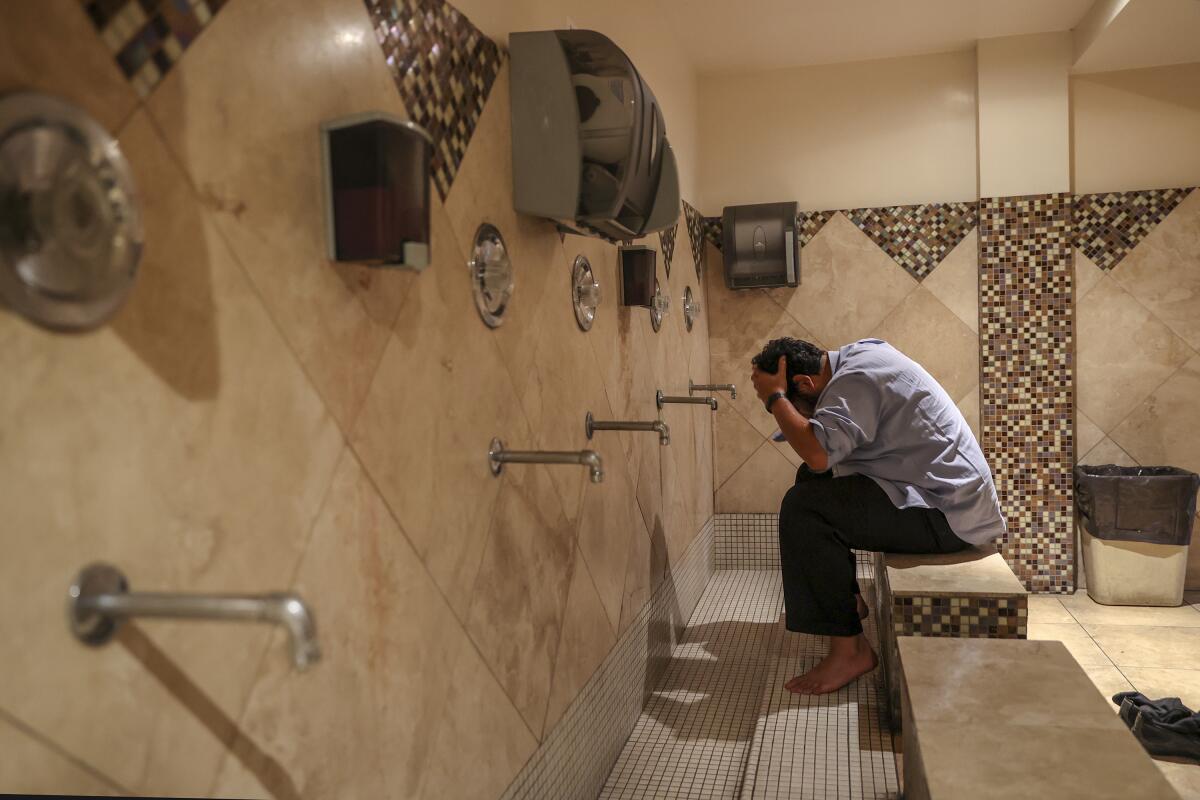
The small fonts or containers usually found at the entrance of a church or chapel will not be filled, nor will the larger baptismal fonts, officials say.
“We are discontinuing that for now,” said John Andrews, media director for the diocese. “People dip their fingers in it and that’s one way infection or a virus can be spread.”
The diocese directive issued earlier this week included an end to full-immersion baptisms, which Andrews said is uncommon. There was also a call for “enhanced janitorial protections” that included a one-time “deep cleaning” of parishes, schools and kitchens.
The decree came on the heels of optional liturgical restrictions issued Feb. 28 by the office of the vicar general, in which churchgoers were encouraged not to hold or shake hands during Mass. Parishioners were also asked not to drink from the cup of consecrated wine and to receive Communion wafers with their hands and not their mouths.
Andrews said there has been some pushback from parishioners.
“Ever since we’ve put this out we’ve had some people contact us and say, ‘You can’t tell me that I can’t have Communion on the tongue,’ and they’re correct about that,” Andrews said. “This is just done to protect them.”
Though parishioners may think some of the steps are drastic, Sean Dempsey, a Jesuit priest and assistant professor of history at Loyola Marymount University, said the Catholic Church took even more dramatic steps in the past to deal with dangerous diseases.
During the 1918-19 Spanish flu, 50 million people died worldwide, nearly 700,000 in the United States. Dempsey said the Archdiocese of Philadelphia worked with that city’s health department and shut down all services and classes.
The vacant schools and churches were converted into makeshift hospitals and medical wards, while clergy aided in health efforts. Actions taken by religious institutions, including the Catholic Church, are less extreme now than during past outbreaks, such as the Great Plague of the 14th century, because diseases are much better understood now.
“The germ theory of disease has only really been around for a couple hundred years,” Dempsey said. “So, prior to that, people identified cities and regions as ‘being ill’ and quarantined towns, which led to catastrophic mortality rates.”
“We’re not panicking here. We’re just changing with the times.”
— IKAR Jewish Community CEO Melissa Balaban
On Thursday, Bishop John Taylor of the Episcopal Church of Los Angeles issued a directive to all churches and schools in the Los Angeles Diocese to stop passing the Communion cup.
“Communion wine may not be offered in our churches … until we can be confident that the danger of mass COVID-19 infections has abated,” Taylor wrote.
Taylor also asked congregants to avoid hugging and handshakes and offer bows and elbow or fist bumps as alternatives.
Religious institutions have also been urging followers to not give in to prejudice.
Grant J. Hagiya, a Los Angeles-area resident bishop with the United Methodist Church, issued a statement Feb. 28 asking members of the roughly 350 churches that span the Los Angeles region to avoid scapegoating or blaming Asians for the spread of the coronavirus.
Within the church, there have been no changes to Communion. But Hagiya asked those who develop flu-like symptoms to seek medical attention, others to stay home if they’re feeling ill, and everyone to wash hands often and sanitize frequently touched surfaces.
At the Fo Guang Shan Hsi Lai Temple in Hacienda Heights, gatherings are being limited. Tours of the 15-acre hillside Buddhist monastery have also been eliminated.
To cut down on visits, the temple is offering its traditional Sunday Dharma service online along with classes that can be found on its website.
“We will bring back the tours when we feel it’s safe and the danger has passed,” said spokeswoman Venerable Zhixing Shih. “We, like others, want our visitors to feel connected and safe.”
The IKAR Jewish community and synagogue have focused on staying calm.
“We’re trying to really balance keeping everyone safe, but also keeping them prepared and making sure they don’t panic,” said IKAR Chief Executive Melissa Balaban. “We’re taking precautions and changing the way we do a few things.”
Balaban emailed guidelines to congregants on Feb. 28, asking them to follow common practices for avoiding the spread of disease, such as washing hands and avoiding touching one’s face.
But Balaban said the harder directive has been to ask people to avoid things such as embracing.
“Our community hugs and kisses, and last week I announced we were going to try to minimize physical contact with one another,” Rabbi Sharon Brous said.
That was easier said than done, she said.
“People struggled to stop,” Brous said. “We realized we had to replace it with something.”
The community developed the “IKAR Hug,” which Brous said involves “putting two hands to the chest and slightly bowing as a gesture of welcoming somebody with love.”
The synagogue, which has about 800 families, has also changed the way Saturday’s post-service meal is served.
In the past, congregants would help themselves to buffet-style dining. Now, Balaban said, gloved staffers or volunteers will serve plates. This would limit the number of hands touching dishes, food and utensils, she said.
“We’re not panicking here,” Balaban said. “We’re just changing with the times.”
More to Read
Start your day right
Sign up for Essential California for news, features and recommendations from the L.A. Times and beyond in your inbox six days a week.
You may occasionally receive promotional content from the Los Angeles Times.
